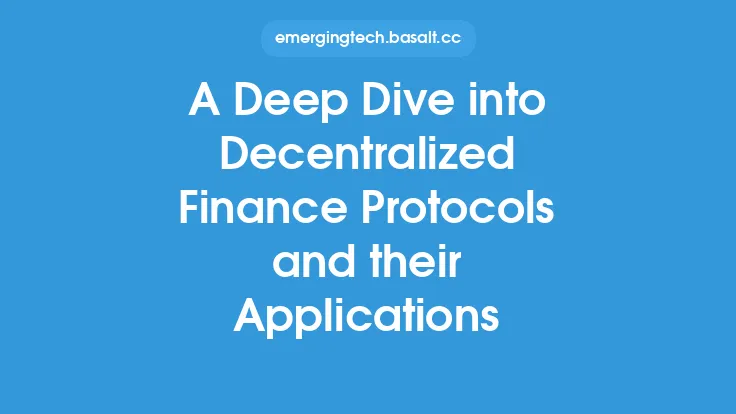The world of blockchain technology has given rise to a plethora of innovative platforms, each with its unique features and capabilities. At the heart of this innovation lies the concept of smart contracts, self-executing contracts with the terms of the agreement written directly into lines of code. These contracts have enabled the creation of decentralized applications (dApps) that can operate autonomously, without the need for intermediaries. In this article, we will delve into the world of smart contract platforms, exploring the most popular ones, including Ethereum, Binance Smart Chain, and others, to understand their strengths, weaknesses, and use cases.
Introduction to Smart Contract Platforms
Smart contract platforms are blockchain-based systems that enable the creation, deployment, and execution of smart contracts. These platforms provide a decentralized environment where developers can build and deploy their dApps, leveraging the security, transparency, and immutability of blockchain technology. The primary function of a smart contract platform is to facilitate the execution of smart contracts, which are essentially programs that run on the blockchain. These contracts can automate various processes, such as the transfer of assets, the execution of transactions, and the enforcement of rules and regulations.
Ethereum: The Pioneer of Smart Contract Platforms
Ethereum is widely regarded as the pioneer of smart contract platforms. Launched in 2015, Ethereum introduced the concept of smart contracts to the world, enabling developers to build and deploy decentralized applications on its blockchain. Ethereum's smart contract platform is powered by the Ethereum Virtual Machine (EVM), which executes smart contracts written in Solidity, a programming language specifically designed for Ethereum. Ethereum's strengths lie in its large and active developer community, its extensive library of decentralized applications, and its robust security features. However, Ethereum's scalability issues and high gas fees have led to the emergence of alternative smart contract platforms.
Binance Smart Chain: A Fast and Low-Cost Alternative
Binance Smart Chain (BSC) is a smart contract platform developed by Binance, one of the largest cryptocurrency exchanges in the world. Launched in 2020, BSC is designed to provide a fast and low-cost alternative to Ethereum, with transaction fees significantly lower than those on the Ethereum network. BSC is compatible with the Ethereum Virtual Machine (EVM), allowing developers to easily migrate their Ethereum-based dApps to the BSC platform. BSC's strengths lie in its high transaction throughput, low latency, and low fees, making it an attractive option for developers who require a scalable and cost-effective smart contract platform.
Other Notable Smart Contract Platforms
In addition to Ethereum and Binance Smart Chain, there are several other notable smart contract platforms that have gained popularity in recent years. These include:
- Polkadot: A decentralized platform that enables interoperability between different blockchain networks, allowing developers to build dApps that can interact with multiple chains.
- Solana: A fast and scalable platform that uses a proof-of-stake (PoS) consensus algorithm, enabling high transaction throughput and low fees.
- Cardano: A platform that focuses on providing a secure and scalable environment for dApp development, with a strong emphasis on formal verification and peer-review.
- NEAR Protocol: A sharded proof-of-stake (PoS) blockchain that provides a scalable and low-cost environment for dApp development, with a focus on usability and developer experience.
Comparison of Smart Contract Platforms
Each smart contract platform has its unique features, strengths, and weaknesses. When choosing a platform for dApp development, developers must consider factors such as scalability, security, cost, and ease of use. The following table provides a comparison of some of the most popular smart contract platforms:
| Platform | Scalability | Security | Cost | Ease of Use |
|---|---|---|---|---|
| --- | --- | --- | --- | --- |
| Ethereum | Low | High | High | Medium |
| Binance Smart Chain | High | Medium | Low | Medium |
| Polkadot | High | High | Medium | Low |
| Solana | High | Medium | Low | Medium |
| Cardano | Medium | High | Medium | Low |
| NEAR Protocol | High | Medium | Low | High |
Use Cases for Smart Contract Platforms
Smart contract platforms have a wide range of use cases, from decentralized finance (DeFi) and gaming to social media and supply chain management. Some of the most popular use cases include:
- Decentralized Finance (DeFi): Smart contract platforms enable the creation of decentralized lending, borrowing, and trading platforms, such as MakerDAO and Compound.
- Gaming: Smart contract platforms provide a secure and transparent environment for gaming dApps, such as Axie Infinity and Decentraland.
- Social Media: Smart contract platforms enable the creation of decentralized social media platforms, such as Mastodon and Diaspora.
- Supply Chain Management: Smart contract platforms provide a secure and transparent environment for supply chain management dApps, such as Waltonchain and VeChain.
Conclusion
In conclusion, smart contract platforms have revolutionized the way we build and deploy decentralized applications. With a wide range of platforms to choose from, developers must carefully consider their needs and requirements before selecting a platform for their dApp development. Ethereum, Binance Smart Chain, and other platforms offer unique features and capabilities, and the choice of platform will depend on the specific use case and requirements of the dApp. As the blockchain ecosystem continues to evolve, we can expect to see new and innovative smart contract platforms emerge, providing even more opportunities for developers to build and deploy decentralized applications.





